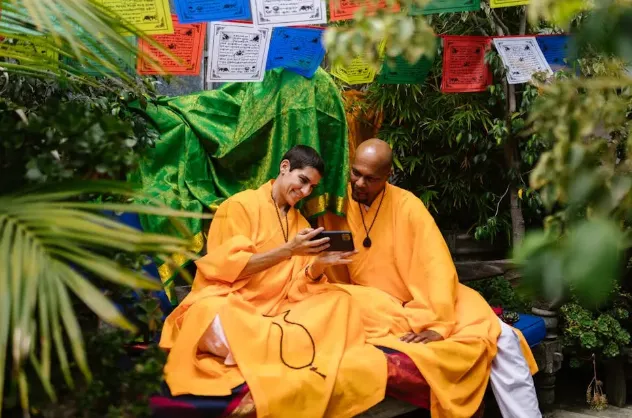Help Crestone Films bring
the wisdom traditions to global audiences.


Blog
Reviews

The Impact of Buddhist Teachings in Modern Cinema
Buddhist teachings, with their profound wisdom and timeless insights, have permeated various aspects of contemporary life, including cinema. This blog explores how these teachings have influenced modern films, providing new dimensions to storytelling and character development.

Understanding Buddhist Philosophy in Cinema
Buddhist philosophy is rich with concepts that offer abundant material for filmmakers. From ideas of impermanence to the pursuit of enlightenment, these teachings provide a framework for storytelling unique and rife with potential. The incorporation of the 'Buddhist contemplative gaze' is one such evolution in cinematic techniques, where filmmakers like Edward A. Burger explore the multidimensional quality of cinema to share and explore Buddhist contemplative experiences Crafting Cinema in the Buddhist Contemplative Gaze. This adds layers to visual storytelling by embedding the viewer into a meditative experience, blurring the lines between reality and the transient cinematic realm.
Cinematic portrayals of Buddhism often focus on the deep philosophical underpinnings of the religion. Through films, directors can share a narrative that delves into the heart of Buddhism's core teaching: the impermanence of life and the constant flow of change. By exploring these themes, filmmakers can captivate audiences with stories that prompt reflection and offer viewers a momentary escape into a world where time and self are fluid concepts.
Themes of Impermanence and Rebirth
One of the most prevalent themes in Buddhism is the concept of impermanence, which is often explored in films through narratives of life, death, and rebirth. Movies reflecting this theme resonate deeply with audiences, prompting them to ponder the transient nature of existence. The portrayal of cycles of death and rebirth in films encourages viewers to reconcile with the fleeting nature of life, fostering a broader understanding of these universal truths.
Cinema provides a unique platform to explore complex philosophical ideas like rebirth. Films have maneuvered through narrative arcs that depict the protagonist's spiritual journey, portraying the cyclical process of life and death that is central to Buddhist doctrine. It is through such storylines that the audience is invited to explore their own fears and misconceptions about mortality. This not only enriches the storyline but also opens a dialogue on how rebirth manifests in everyday life. As discussed in various perspectives, this cinematic exploration aligns seamlessly with Buddhist views, making it an ideal canvas for spiritual and philosophical storytelling.
The Path to Enlightenment in Film Narratives
A recurring plot in many films influenced by Buddhism is the protagonist's journey towards enlightenment. This journey often mirrors the real and symbolic quest for understanding one’s true nature and attaining spiritual growth. The quest for enlightenment—portrayed through personal growth, challenges, and moments of insight—provides an enriching narrative arc that captivates and inspires viewers.
Mindfulness and its Representation on Screen
The practice of mindfulness—a pivotal aspect of Buddhist practice—has also found its way onto the silver screen. Films that incorporate this element often focus on characters who learn to live in the present moment, finding peace and clarity amid chaos. This aspect of mindfulness transforms the viewing experience, encouraging the audience to slow down and become more aware of the world surrounding them, akin to the 'Buddhist contemplative gaze' seen in films like 'One Mind' Crafting Cinema in the Buddhist Contemplative Gaze.
Embracing Compassion and Karma Through Characters
Characters in films inspired by Buddhist philosophies frequently echo the teachings of compassion and karma. Their stories illustrate how acts of kindness create ripples that impact both themselves and the world around them. Such narratives are exemplified in films produced by Crestone Films Wisdom Traditions Video Library, which often center around influential figures such as the Karmapa, whose compassionate teachings transcend cultural and spiritual boundaries.
The Influence of Zen Aesthetics in Cinematic Storytelling
Zen Buddhism promotes simplicity and nature, which have profoundly affected cinematic storytelling and visual representation. Many filmmakers have embraced this aesthetic to create films that reflect the beauty and tranquility of Zen. This approach can be seen in the minimalist and serene visuals employed in narratives that aim to harmonize with nature, offering a reflective mirror for viewers seeking solace amidst the fast-paced modern world.
The Lasting Influence of Buddhism in Film
Buddhist teachings have undeniably left a significant mark on modern cinema. By infusing films with profound themes of mindfulness, compassion, and the quest for meaning, filmmakers have been able to create narratives that resonate deeply with audiences around the world. As cinema continues to evolve, the timeless wisdom of Buddhism will likely continue to inspire and transform the stories we tell and the way we tell them.
“Physically and psychically transformative.”
YOGA JOURNAL
“[THE LION'S ROAR] speaks with uncommon clarity on the nature
of Buddhist life and thought… An important, lasting monument.”
“[YANGSI] unfolds in a cinema verité style that
offers an absorbing, intimate glimpse into a
religious tradition, a culture and a remarkable life. ”
“Beautifully done, [BODHISATTVA]
is a charming, educational, uplifting treasure.”
LIGHT OF CONSCIOUSNESS MAGAZINE
“Astonishing.”
SPIRITUALITY AND PRACTICE
ONLINE MEDIA

© 2024 by Crestone Films
